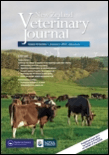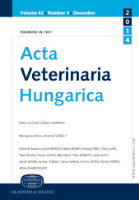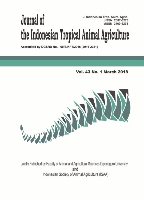
Revista Colombiana de Ciencias Pecuarias
Scope & Guideline
Pioneering Innovations in Veterinary Science and Animal Welfare
Introduction
Aims and Scopes
- Animal Health and Disease Management:
The journal covers a wide range of topics related to the health of livestock and companion animals, including disease diagnosis, treatment, and prevention strategies. - Animal Production and Management Practices:
Research focused on improving productivity in various livestock species through optimized feeding practices, breeding strategies, and management techniques is a core area. - Veterinary Science and Clinical Studies:
Clinical veterinary studies, including pharmacology, surgery, and disease management, are significant, particularly those that contribute to better animal welfare. - Food Safety and Quality:
The journal emphasizes studies that assess the quality and safety of animal products, including meat, milk, and eggs, addressing concerns related to foodborne pathogens and residues. - Sustainable Practices in Animal Agriculture:
Research that promotes sustainable practices, including environmental impacts of livestock production and resource management, is increasingly emphasized. - Molecular and Genetic Studies:
The integration of molecular biology and genetics in animal breeding and health, exploring genetic diversity and disease resistance, is a key focus area.
Trending and Emerging
- Integration of Medicinal Plants and Natural Products:
There is a growing interest in the use of medicinal plants and natural additives for improving animal health and productivity, highlighting a trend towards more holistic and sustainable practices. - Antimicrobial Resistance Research:
Research addressing antimicrobial resistance in livestock is increasingly prominent, reflecting global concerns about antibiotic use and food safety. - Climate Impact and Sustainable Livestock Practices:
Studies that examine the environmental impact of livestock production and explore sustainable practices are becoming more common, aligning with global sustainability goals. - Innovative Feeding Strategies:
Research focused on novel feeding strategies, including the use of probiotics, enzymes, and alternative feed ingredients, has gained traction as a way to enhance animal performance and health. - Genomic and Molecular Approaches in Breeding:
The use of genomic tools and molecular techniques to enhance breeding programs and animal health is an expanding area of research, reflecting advancements in biotechnology.
Declining or Waning
- Traditional Breeding Methods:
Research centered on conventional breeding methods has seen a decline as more emphasis is placed on genetic engineering and molecular techniques to improve livestock traits. - Generalized Animal Welfare Studies:
While animal welfare remains important, specific studies that broadly address welfare without integrating practical applications or measurable outcomes have decreased. - Non-Agricultural Animal Studies:
Research focusing on non-agricultural animals or pets has waned, as the journal increasingly prioritizes studies directly linked to agricultural and production systems. - Basic Nutritional Studies:
Basic research on animal nutrition without practical application or innovative approaches is less frequently published, as the journal seeks more applied research that addresses specific challenges. - Veterinary Public Health Studies:
The scope of veterinary public health studies is declining, which may reflect a shift towards more specialized topics within animal health and production.
Similar Journals

ZUCHTUNGSKUNDE
Exploring breakthroughs in animal welfare and productivity.ZUCHTUNGSKUNDE is a distinguished journal published by EUGEN ULMER GMBH CO that has been advancing the field of animal science and zoology since its inception in 1977. With its ISSN 0044-5401 and E-ISSN 1867-4518, this journal provides a vital platform for researchers, professionals, and students in the realms of animal genetics, breeding, and veterinary studies. Although currently categorized in the fourth quartile for both Animal Science and Zoology and Food Animals, ZUCHTUNGSKUNDE serves as an essential resource for sharing innovative research findings and methodologies. Located in Stuttgart, Germany, the journal is strategically positioned to foster collaboration within the European agricultural and biological sciences community. Researchers are encouraged to contribute their insights to enhance the understanding of breeding practices and improve animal welfare and productivity. Despite its challenges, ZUCHTUNGSKUNDE remains committed to addressing key issues within its scope, paving the way for future advancements in animal science.

NEW ZEALAND VETERINARY JOURNAL
Advancing animal health through rigorous research.NEW ZEALAND VETERINARY JOURNAL, published by Taylor & Francis Ltd, stands as a pivotal platform in the realm of veterinary science, contributing significantly to the global discourse on animal health and welfare since its inception in 1952. With an ISSN of 0048-0169 and an E-ISSN of 1176-0710, this journal offers invaluable insights within both the veterinary and general medical fields, currently achieving a commendable Q2 ranking in Veterinary (miscellaneous) and Q3 in Medicine (miscellaneous) for 2023. Its Scopus ranking places it in the 76th percentile among veterinary journals, affirming its high-impact presence in academia. While access to this journal is not open, it maintains an essential role for researchers, professionals, and students aiming to advance their knowledge and contribute to the field of veterinary science. With a commitment to disseminating quality research, NEW ZEALAND VETERINARY JOURNAL enriches the understanding of veterinary practices and enhances ongoing dialogue on critical health issues affecting animals, promoting better outcomes through scientific inquiry.

Slovenian Veterinary Research
Pioneering Research for a Healthier Animal WorldSlovenian Veterinary Research, published by the University of Ljubljana, serves as a significant platform for the dissemination of research within the veterinary field. With an ISSN of 1580-4003 and an E-ISSN of 2385-8761, this open-access journal has made its content freely available to the global research community since 2021, enhancing accessibility and engagement. The journal's scope includes a diverse range of topics relevant to veterinary science, aiming to foster innovation and collaboration among researchers, professionals, and students in the field. Although currently categorized in the Q4 quartile for veterinary studies, the journal is committed to improving its impact and visibility, particularly as it converges on its upcoming years of operation from 2007 to 2024. As it strives to elevate its Scopus ranks, currently positioned at rank #162/194 in General Veterinary, Slovenian Veterinary Research provides a vital resource for advancing knowledge and best practices in veterinary medicine. For anyone interested in the latest veterinary research trends and findings emanating from Slovenia and beyond, this journal represents an essential source of information.

ACTA VETERINARIA HUNGARICA
Advancing veterinary science, one study at a time.ACTA VETERINARIA HUNGARICA is a prestigious academic journal published by AKADEMIAI KIADO ZRT, dedicated to the diverse field of veterinary science. With a history spanning over three decades since its inception in 1983, this journal provides a platform for the dissemination of high-quality research, clinical studies, and reviews that contribute to advancing knowledge in veterinary medicine and animal health. Based in Hungary, it has built a respectable reputation, reflected in its Scopus ranking, where it occupies the 84th position out of 194 in the General Veterinary category, placing it within the 56th percentile. Although the journal is not open access, it continues to attract a global audience of researchers, professionals, and students who are keen on exploring advancements in veterinary science as it converges towards its upcoming year of 2024. Readers will find valuable insights that foster innovation and improve animal care practices across various settings, making ACTA VETERINARIA HUNGARICA an essential resource for anyone involved in the veterinary field.

Ankara Universitesi Veteriner Fakultesi Dergisi
Disseminating groundbreaking insights for animal welfare.Ankara Universitesi Veteriner Fakultesi Dergisi is a prominent academic journal published by ANKARA UNIV, focusing on advancements in veterinary sciences and animal biology. Since its inception, the journal has been committed to disseminating high-quality research, featuring articles that span a variety of topics within veterinary medicine and animal science. With an ISSN of 1300-0861 and an E-ISSN of 1308-2817, this journal provides valuable insights into the latest research developments and trends, making it a critical resource for researchers, professionals, and students in the field. The journal has established itself within the scholarly community, achieving a Q3 rank in Animal Science and Zoology and a Q2 rank in Veterinary (miscellaneous) as of 2023, reflecting its growing relevance and impact. Positioned in Turkey, it serves as a vital platform for both local and international scholars to share innovative findings and foster collaboration. Enhancing its accessibility, the journal's content is available through various academic databases, ensuring that its readership can effortlessly access and engage with cutting-edge research.

EGYPTIAN JOURNAL OF VETERINARY SCIENCE
Advancing veterinary knowledge for a healthier tomorrow.Welcome to the Egyptian Journal of Veterinary Science, a pivotal publication dedicated to advancing the field of veterinary science, particularly within the unique context of Egypt and the surrounding regions. Published by the Natl Information Documentation Centre, this journal has been a key scholarly resource since its inception in 1977, focusing on diverse aspects of veterinary medicine, including animal health, nutrition, and management practices. With an impressive editorial commitment and a wide scope covering animal science, equine studies, food animals, and small animal veterinary practice, the journal stands as a critical platform for researchers and professionals alike. While currently categorized in Q4 for Animal Science and Zoology, and achieving Q3 rankings in several other veterinary subfields, it serves as a vital avenue for disseminating innovative research and practical insights. Access to the latest findings and case studies aims to foster improved veterinary practices and enhance animal welfare standards. As we navigate the complexities of veterinary science, the Egyptian Journal of Veterinary Science remains an essential tool for those committed to the health and welfare of animals across various disciplines.

Tropical Animal Science Journal
Exploring Innovations in Veterinary Medicine and Animal ScienceTropical Animal Science Journal, ISSN 2615-787X, E-ISSN 2615-790X, is an esteemed open-access journal published by the Bogor Agricultural University, Faculty of Animal Science. Launched in 2018, this journal serves as a pivotal platform for disseminating high-quality research in the fields of Animal Science, Food Animals, and Veterinary Medicine. With its significant presence in Indonesia and a commitment to scientific innovation, it has achieved a Q3 ranking in Animal Science and Zoology and Food Animals, as well as a Q2 ranking in Veterinary (miscellaneous) as of 2023. The journal also enjoys favorable Scopus rankings, placing it in the 61st percentile for General Veterinary and demonstrating its relevance and impact in the academic community. As an advocate for open-access publishing since its inception, the journal enhances accessibility to critical research findings, making it an invaluable resource for researchers, professionals, and students alike who aim to advance their knowledge and contribute to the fields of tropical animal science.

Scientific Papers-Series D-Animal Science
Elevating Standards in Veterinary Medicine and Animal CareScientific Papers-Series D-Animal Science is a prominent academic journal published by the University of Agronomic Sciences and Veterinary Medicine Bucharest (USAMV). With its ISSN number 2285-5750 and E-ISSN 2393-2260, this journal serves as a critical platform for the dissemination of innovative research in the field of animal science and veterinary medicine. The journal focuses on a broad range of topics, from animal breeding and nutrition to health and welfare, contributing significantly to the advancement of knowledge and practice within these vital areas. Although it currently does not offer open access, the journal maintains a commitment to high-quality research with the potential to influence policy and practice in animal sciences. Researchers, professionals, and students are encouraged to engage with the journal to enhance their understanding and contribute to ongoing discussions in this essential field. The journal's rich academic environment fosters collaboration and encourages submissions of original studies, reviews, and case reports that can shape the future of animal science.

Journal of the Indonesian Tropical Animal Agriculture
Championing Open Access Research in Animal AgricultureJournal of the Indonesian Tropical Animal Agriculture is an esteemed peer-reviewed journal published by UNIV DIPONEGORO, focusing on the dynamic fields of animal science and veterinary medicine. Since its inception in 2009, the journal has maintained an open access policy, ensuring that valuable research is freely available to the global scientific community. Based in Indonesia, the journal has adapted to the evolving agricultural landscape and now contributes significantly to both local and international discourse on tropical animal husbandry. With a Scopus rank placing it within the 36th percentile for general veterinary sciences and the 25th percentile for animal science and zoology, it is emerging as a valuable resource for researchers and professionals alike. The journal covers a broad range of topics within its scope, fostering innovative approaches and solutions tailored to the unique challenges of the tropical environment. By exploring critical issues in animal agriculture, this journal not only enhances academic knowledge but also supports sustainable practices within the industry. We invite researchers, students, and professionals in the realm of veterinary science and animal agriculture to engage with the rich array of research presented in this journal.

Animals
Empowering animal research through open access collaboration.Animals is an esteemed open-access journal published by MDPI, focusing on the dynamic fields of Animal Science and Zoology, as well as Veterinary Sciences. Established in 2011, it has quickly garnered a prominent reputation, achieving Q1 rankings in both Animal Science and Veterinary (Miscellaneous) categories in 2023. With an impressive Scopus ranking placing it in the top 15% of Veterinary journals and the top 13% in Animal Science, Animals serves as a vital platform for researchers and professionals to disseminate and share innovative studies that advance knowledge in animal biology, husbandry, welfare, and veterinary care. By promoting open access since its inception, the journal ensures unrestricted availability of cutting-edge research to a global audience, fostering collaboration and inspiring further studies in the field. Located in the heart of Switzerland, at St. Alban-Anlage 66, Basel, Animals is essential for anyone dedicated to understanding and enhancing the welfare and management of animals across various disciplines.